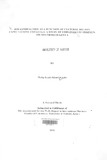| dc.description.abstract | The purpose of this study was two-fold. First, a conceptual framework was
developed to link cultural beliefs, expectations, personal goals and job satisfaction of the
employees working in foreign-owned firms in Kenya. Second, the following lour specific
objectives were developed to guide the study: to determine the relationship between
employees' cultural beliefs and job satisfaction; to determine the relationship between
employees' goals and job satisfaction;' to determine the relationship betvveen employees'
expectations and job satisfaction, and to determine if a difference existed between Kenyans
and non-Kenyan employees working in foreign-owned firms in Kenya vvhich compared
simultaneously on cultural beliefs, expectations, personal goals and job satisfaction.
The sample consisted of Kenyan and non-Kenyan employees wurk ing 111 seven
foreign-owned firms operating In Nairobi, Kenya. The data was collected using a
questionnaire developed by Hofstede (I 0RO). Hostede's instrument contains measures of
employees' cultural beliefs, expectations, personal goals and job satisfaction ill work-related cultural values found in the workplaces.
The major findings of the study showed that: 1) there exists weak to moderate
relationship between cultural beliefs, goals, expectations and job satisfaction among
employees work ing in the seven foreign-owned firms; 2) employee cultural beliefs had a
positive and statistically significant relationship with job satisfaction, .3) There existed
statistically significant relationship between goals and job satisfactiun, 4) there existed
statistically significant differences in job satisfaction between female and male employees
when gender and employee length of employment were used as independent variables in an analysis of variance model; 5) the multivariate analysis of variance suggest that the Kenyan and non-Kenyan employees were significantly different from each other on cultural beliefs and employee goals; 6) there were no meaningful differences that existed in selected demographic variables-age of the employee, length of employment and years of formal education, when job satisfaction was used as the dependent variable, except where gender and employee's length of employment were used as independent variables
Major findings and conclusions of the study are discussed in view of their
implications for future research, research design methodology, policy and practice. | en |

